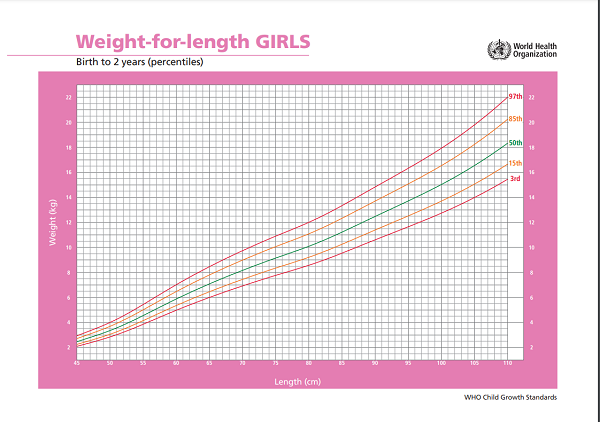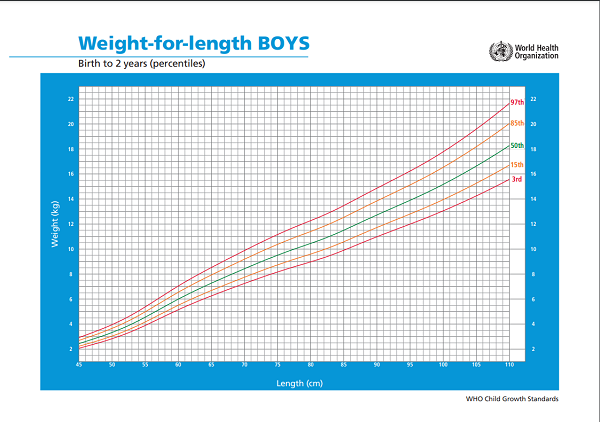How to determine a baby’s healthy weight
Healthy infants come in a range of sizes. Still, infant growth tends to follow a fairly predictable path. Your baby's position on the curve in a growth chart isn't as important as the trend of the curve overall. Read on to learn more about healthy weight for babies and toddlers.


General guidelines for infant growth in the first year
- From birth to age 6 months, a baby might grow about 1.5 to 2.5 centimeters a month and gain about 140 to 200 grams a week. Expect your baby to double his or her birth weight by about age 5 months.
- From ages 6 to 12 months, a baby might grow about 1 centimeter a month and gain about 85 to 140 grams a week. Expect your baby to triple his or her birth weight by about age 1 year.
What is abnormal for a baby’s weight?
Both extremes of weight are considered out of range. A baby who is under the 3rd percentile or a baby who is over the 95th percentile. You can use the baby’s measurements to track your child's growth trend and to compare your baby's growth with that of other infants of the same sex and age. According to the World Health Organization growth charts, a baby with a weight-for-length greater than the 98th percentile is considered to have a high weight-for-length.


Guidelines for a healthy weight for babies
Babies need a varied diet that consists of three major groups: carbohydrates, proteins, and fats. They do need a diet high in fat to support growth during infancy. An exclusively breastfed baby gets about half of his or her daily calories from the fat in breast milk. As a result, caloric restrictions aimed at reducing weight are not recommended for babies 2 years and under. Excess fat and calories can still be a concern, though. For example, being too heavy can delay crawling and walking, essential parts of a baby's physical and mental development. While a large baby may not become an overweight child, a child who is obese often remains obese as an adult.
To keep your baby at a healthy weight
- Monitor your weight gain during pregnancy. Excessive weight gain during pregnancy can increase a baby's birth weight. Research suggests that as birth weight grows, so does the risk of childhood obesity. A healthy weight for the mom helps to have a healthy weight for the baby.
- Breast-feed. Some research suggests that breastfeeding reduces the risk of childhood obesity.
- Limit sugar-sweetened drinks. Juice isn't a necessary part of a baby's diet. As you start introducing solid foods, consider offering nutritious whole fruits and vegetables instead.
- Experiment with ways to soothe your baby. Don't automatically turn to breast milk or formula to quiet your baby's cries. Sometimes a new position, a calmer environment, or a gentle touch is all that's needed.
- Limit media use. The American Academy of Pediatrics discourages media use by children younger than 2 years. The more TV your child watches, the greater his or her risk of becoming overweight.
Childhood obesity
As mentioned previously it is not recommended to do caloric restrictions for babies under the age of 2 years. But there are some steps that can spare your child this obesity:
- If your baby is getting simple sugars, substitute that with high-fiber carbohydrates.
- Encourage daily intake of fruits and vegetables.
- Reduce intake of processed foods.
- Eat at home as a family often.
- Be a role model, when your child sees you enjoying your food, they are more likely to enjoy it too.
- Having your child be with you at the dinner table helps develop healthy eating habits.
- Get active. Going to the park, playing on the floor, and doing obstacle courses are some ideas for babies.
- Avoid using the stroller for a long time and once your baby is mobile, select outings where your baby can move around freely.
Also read Your guide to Milk Allergy In babies






